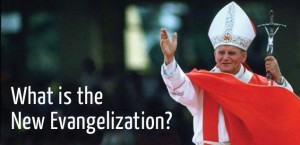I believe the NE (New Evangelization) and “handing on the faith” today is not purely or even mostly a cognitive task or challenge. It is not solely about our passing on formulaic content. I think THE TASK IS A PROFOUNDLY SOCIOLOGICAL ONE. Sociology has experienced a disciplinary turn away from examining predominantly cognitive, belief, and rational factors (as important as these are) TO examining emotional, bodily, ritual factors (or mind to body; language to behaviors; rational to nonrational, ideas to practices; texts to performances; myths to rituals or in more liturgical terms lex orandi, lex credendi and the Catholic understanding of mystagogical catechesis).
Based on the above shifts in emphasis, I believe the NE must address the atrophy of communal participation via upward social mobility and other secular ritual practices of separation, by advocating and promoting a socially embedded Catholicism via geographic stability and the Modified Extended Family form (this is a form of family where families live in nuclear households but live within a few miles of one another – this is a family form that needs further discussion but for another blog perhaps). It requires the creative reconstruction and intensification of Catholicism as a COMMUNAL reality of HABIT, prayer, reflection, dialogue and debate, that is, of Catholicism’s social ritual practices (and of course, having a personal relationship with Jesus). The problem today is not only that younger Catholics have not had passed on to them a good synthesis of the old and new Catholicism so that they might engage culture in a discerning way. It is that they see less CONNECTION between faith and their parish community. That is, youth do not see in a ritual practice way their parish as a reservoir of social connectedness for themselves, their friends, or their parents.
Parish life, small faith communities, devotions, the liturgy, and what sociologists call special purpose groups that exist in most parishes are obviously means for meeting the need for greater Catholic communal solidarity. In the wake of the post-conciliar dissipation of other catholic social structures the liturgy, in particular, has increasingly carried the burden of meeting this need. This is a necessary and legitimate function of the liturgy. It is not, however, liturgy’s sole function and will be inadequate minus other social ritual practices that provide experiences of church community building. Evangelization and HANDING ON THE FAITH in a culture of individualism, choice, and an unfettered market economy is a daunting task. To be successful, it must be attended by a HANDING ON OF THE COMMUNITY via the community’s religious and social ritual practices as well as its ideas or theologies about sacraments and the NE.
